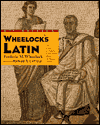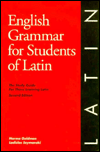Elementary
Latin
Monmouth
College
Course
Description / Texts / Instructor
/ Class
Goals and Format / Grading
Summary / Grading
Scale / Requirements
/ Useful
Websites / Class Photo
About the
Instructor
Virginia Hellenga, Lecturer in Classics,
Department
of Classics, Monmouth College
Office phone
309 457-2332
Home in the woods 309
734-8758
E-mail virginia@monm.edu
Honesty and
Plagiarism:
Students are encouraged to
do their homework together. All other classwork, especially quizzes and
exams, must be the student's own work. Plagiarism, i.e., copying someone
else's work without giving credit, is to be avoided. Such copying--from a
book, another classmate's paper, or any other source--is dishonest. Any
student submitting plagiarized work will receive a failing grade for that
assignment. If two papers with identical or nearly identical work are
submitted by different students, both papers will receive a failing
grade.
Caveat:
This syllabus is
subject to revision by the instructor, provided that written or verbal
notice is given in class.
Course
Description:
This course is primarily
directed towards students desiring to meet the freshman requirements for
graduation under the foreign language component of the Language rubric. Elementary Latin can
also fulfill partial requirements for a major in Latin or Classics.
The
Monmouth College catalogue gives the following description of courses that
meet the Language requirement:
The creation and use of language is the most
significant achievement of human beings, for our ability to organize our
understanding in verbal symbols and to communicate sets us apart from all
other life forms. The symbols of our language make communication possible
at many different levels of meaning and allow us to translate our private
experience into universal terms.... A sure understanding of language is
the foundation of all knowledge, and the ability to use verbal symbols
effectively is the most important of all skills.
This component provides that every student have experience with a
second language. The study of a foreign language allows students to see
that their native language often reflects cultural needs and interests at
the same time that it shares many basic patterns with other languages.
The aim of these courses is to learn
basic reading and writing skills in Latin as
quickly and as thoroughly as possible. At the end of two terms of
Elementary Latin a student should know the
fundamentals of Latin grammar, have a basic Latin vocabulary, and be able to read any Latin text with the help of a dictionary. Speaking and
listening skills in Latin will be encouraged only
in order to assist the development of reading and writing Latin. Reading Latin is
much more important than speaking or writing it.
|
Texts
for Latin
101/102
|
 |
Wheelock,
Frederic, and Richard LaFleur. LATIN.
Sixth Edition, Harper
Collins 2000. Paperback. 0060956410 |
| |
|
| [photo not availvable] |
Traupman, John
TRAUPMAN NEW COLLEGE LATIN &
ENGLISH DICTIONARY, Revised Bantam,1995
|
| |
|
 |
Groton, Anne, and James
May.
38 Latin Stories Designed to Accompany Frederic
M. Wheelock's Latin
Third
Edition, Revised. Bolchazy-Carducci Publishers, 1989.
0865162336
|
| |
|
 |
Goldman, Norma, and
Ladislas Szymanski
English Grammar for Students of
Latin: The Study Guide for Those Learning
Latin
Second Edition. The Olivia and
Hill Press, 1996.
0934034192
|
Standing offer for extra credit: If
you submit a 250-word review of one of these books to http://www.barnesandnoble.com/
or http://www.amazon.com/ and send
the link to the instructor, you will get extra credit in this course. This
offer two weeks before the end of the semester.
Back
to the Top
Class
Goals and Format:
Class usually meets on Mondays,
Tuesdays, Wednesdays, and Fridays from 9:00 a.m. until 9:50 a.m. in
room 423 Haldeman-Thiessen Science Center. Occasionally Thursday meetings may replace other regular
meetings. There will be daily assignments from the textbook. In
addition, there may be a number supplementary readings in Latin and map work.
Summary of Grading:
The goal is for all
students to earn the best possible grade. The grading system is
designed to give each student maximum control of the final grade
earned. The focus of all assignments, quizzes and tests is not
grading but learning.
The starting point for the final course grade is the average of
all the exams. Students will be encouraged to correct their exams
for half credit on points lost.
A low exam average can be raised by successful completion of
homework assignments and "essential idea" exercises which are
administered in class on a daily basis. Students can correct and
resubmit homework assignments for a higher grade and can improve
their performance on these essential ideas by retaking the exercises
before or after class. If the average of the grades on these
homework assignments and "essential idea" exercises is higher than
the exam grade average, the final grade will be adjusted up
accordingly. A student with a passing average for homework and
"essential idea" exercises is guaranteed a passing grade in the
course (no matter the exam grade average).
Workbook assignments are optional. Each workbook assignment
submitted on time (and then returned with corrections) will earn two
extra points on the next exam.
Each student is permitted three unexcused absences during the
semester. Any additional unexcused absence from class will result in
the loss of one point on the final grade for each absence.
("Sleeping in" or the alarm not going off are not excuses.)
|
This webpage was prepared by Professor Thomas J. Sienkewicz of
Monmouth College. If you have any
questions, you can contact him at toms@monm.edu.
Back
to the Top
Back to the Monmouth College
Classics Dept.
Homepage |


